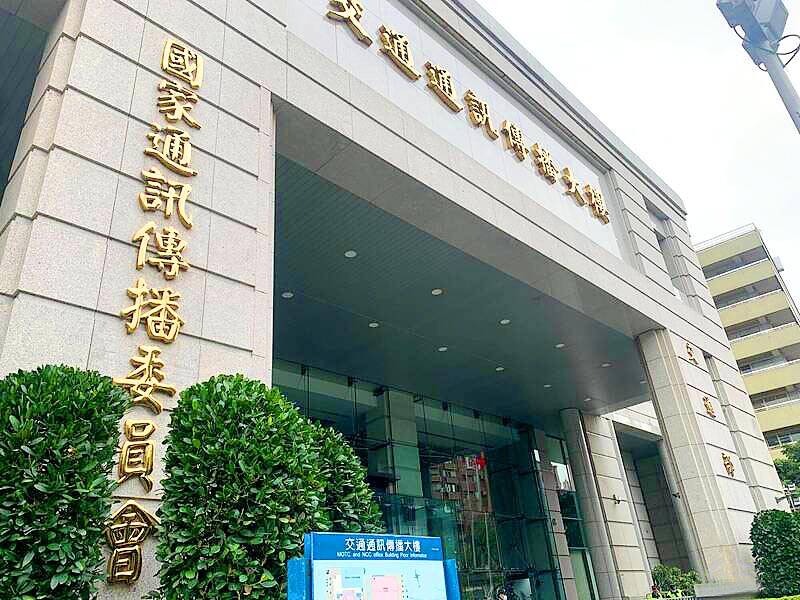The National Communications Commission (NCC) yesterday extended to June the deadline for cable television companies to replace channels formerly operated by Walt Disney Co, citing a need for more market research.
Disney on Jan. 1 terminated broadcast on five channels as part of its pull-out from the Taiwanese cable television market, leaving vacancies that other firms cannot permanently fill without NCC approval.
The channels formerly operated by Disney were National Geographic, Star Channel Chinese, Star Channel Movies, Star Movies Gold and Star World.

Photo: Ting Yi, Taipei Times
While replacement channels are being aired, cable companies still need NCC authorization before permanently filling the slots, NCC Vice Chairman Wong Po-tsung (翁柏宗) said.
This involves submitting viewership and audience satisfaction data for the proposed substitutes, but companies are reporting that they do not have time to complete the latter, Wong said.
The deadline for renewing the license to broadcast on the channels was extended to June 30, with the condition that cable companies submit viewership and audience satisfaction data before the end of May, he said.
Companies had given the NCC viewership data and reported being unable to complete the market research to produce a reliable report on viewer satisfaction, Wong said.
South Korea-based KMTV Asia and Taiwan-based Catchplay Movie are the most commonly utilized substitutes for Star Channel Chinese and Star Channels among the nation’s 63 television cable companies.
These have sparked public discussion over the need to promote domestically produced Chinese-language content on channel 31, which was formerly used by Star Channel Chinese.
An NCC spokesperson said preliminary data showed that KMTV Asia’s satisfaction rate was about 61 percent across cable networks, while other replacement channels achieved satisfaction rates ranging from 65 to 90 percent.
The company that owns KMTV has said that it would produce locally made programs if enough cable systems adopted their channel to fund production, the spokesperson said.

Taiwanese can file complaints with the Tourism Administration to report travel agencies if their activities caused termination of a person’s citizenship, Mainland Affairs Council Minister Chiu Chui-cheng (邱垂正) said yesterday, after a podcaster highlighted a case in which a person’s citizenship was canceled for receiving a single-use Chinese passport to enter Russia. The council is aware of incidents in which people who signed up through Chinese travel agencies for tours of Russia were told they could obtain Russian visas and fast-track border clearance, Chiu told reporters on the sidelines of an event in Taipei. However, the travel agencies actually applied

Japanese footwear brand Onitsuka Tiger today issued a public apology and said it has suspended an employee amid allegations that the staff member discriminated against a Vietnamese customer at its Taipei 101 store. Posting on the social media platform Threads yesterday, a user said that an employee at the store said that “those shoes are very expensive” when her friend, who is a migrant worker from Vietnam, asked for assistance. The employee then ignored her until she asked again, to which she replied: "We don't have a size 37." The post had amassed nearly 26,000 likes and 916 comments as of this

New measures aimed at making Taiwan more attractive to foreign professionals came into effect this month, the National Development Council said yesterday. Among the changes, international students at Taiwanese universities would be able to work in Taiwan without a work permit in the two years after they graduate, explainer materials provided by the council said. In addition, foreign nationals who graduated from one of the world’s top 200 universities within the past five years can also apply for a two-year open work permit. Previously, those graduates would have needed to apply for a work permit using point-based criteria or have a Taiwanese company

The Shilin District Prosecutors’ Office yesterday indicted two Taiwanese and issued a wanted notice for Pete Liu (劉作虎), founder of Shenzhen-based smartphone manufacturer OnePlus Technology Co (萬普拉斯科技), for allegedly contravening the Act Governing Relations Between the People of the Taiwan Area and the Mainland Area (臺灣地區與大陸地區人民關係條例) by poaching 70 engineers in Taiwan. Liu allegedly traveled to Taiwan at the end of 2014 and met with a Taiwanese man surnamed Lin (林) to discuss establishing a mobile software research and development (R&D) team in Taiwan, prosecutors said. Without approval from the government, Lin, following Liu’s instructions, recruited more than 70 software